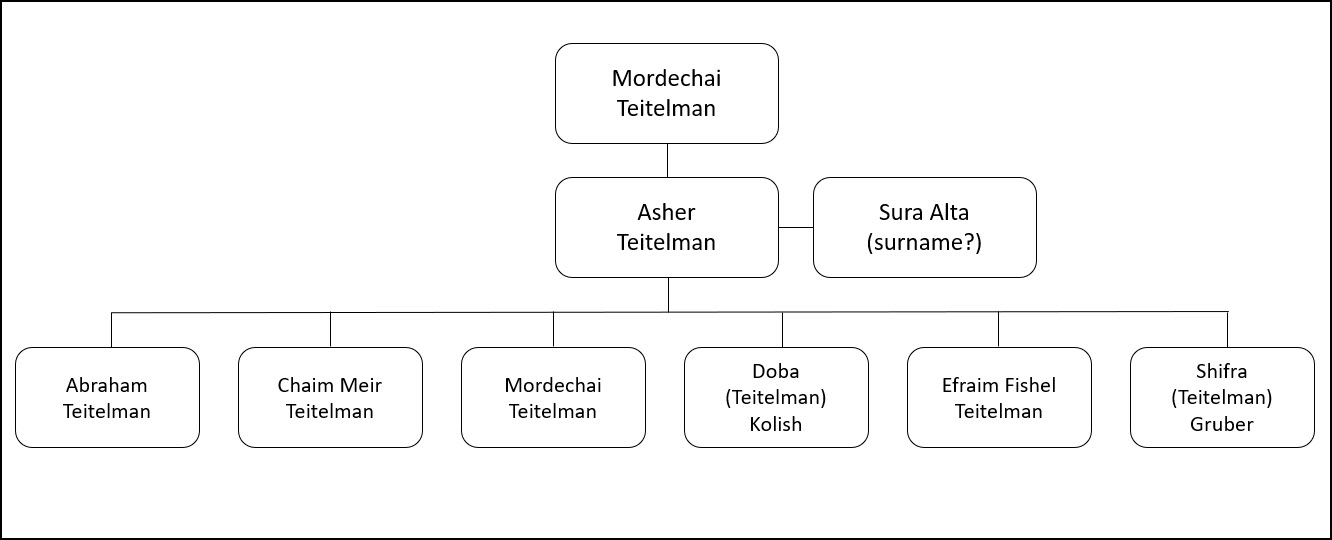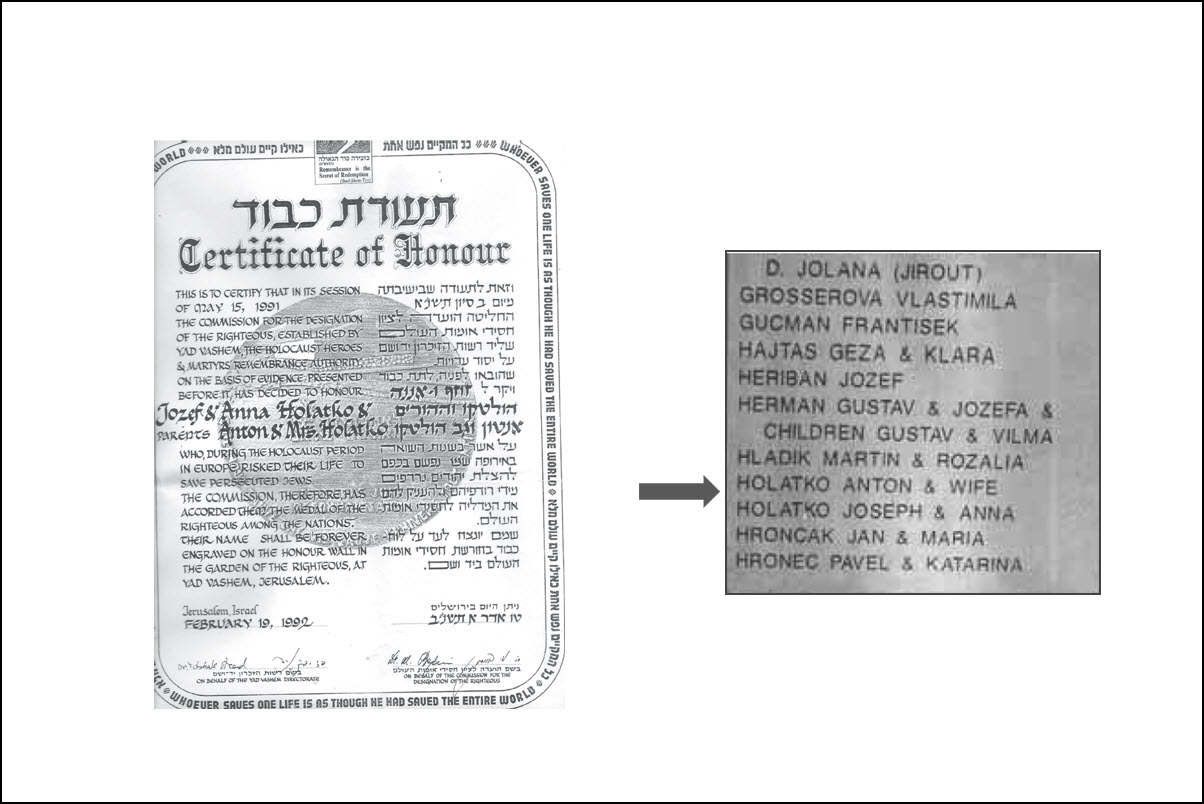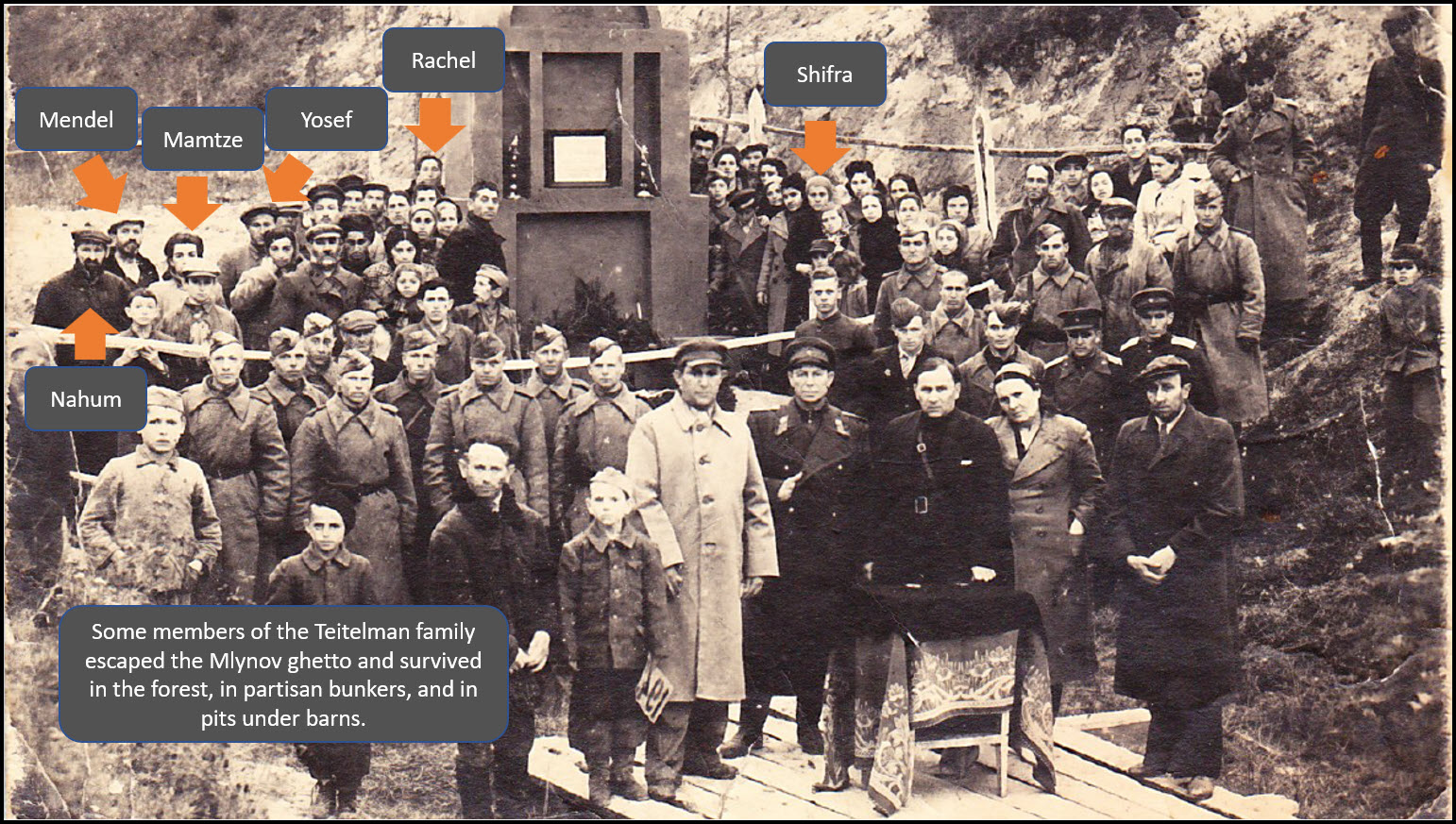-
Home
Home About Network
- History
Nostalgia and Memory The Polish Period I The Russian Period I WWI Interwar Poland 1944 Memorial Commemoration- People
Famous Descendants Families from Mlynov Ancestors By Birthdates- Memories
The Teitelman Family from Mlynov and Mervits (continued...)

***
(return to start of Teitelman story )
The Teitelmans all had a common ancestor named Mordechai Teitelman who is believed to have come to the area before it even became part of Russia. The 1850 and 1858 revision lists for Mlynov shows there was already a sizeable “Teitelboym” family living in Mlynov at the time. It seems possible that the 12-year-old boy named Morko-Ios in the 1858 was this Teitelman ancestor or named for that ancestor.
According to descendants traditions, the patriarch Mordechai Teitelman had a son, Asher Teitelman, who married a woman named Sura Alta and had six children, each of whom had large families. The six children were: Abraham Leib, Chaim Meir, Doba, Mordechai, Shifra and Efraim-Fishel. The names of 31 grandchildren are known from the next generation and you can do some multiplication to estimate the number of great grandchildren, the majority of whom did not survive. The Teitelman family may have been as large or larger than the Goldseker family remembered as one of Mlynov’s biggest families.
In addition to the Teitelman couples mentioned above and some of their children and siblings, there were also several Teitelman descendants from other lines who made aliyah in the 1930s and whose descendants live in Israel and the United States. Among others, Moshe (Teitelman) Tamari (1910– 2007), grandson of Efraim Fishel Teitelman, was born in Varkovitchi but grew up in Mlynov and made aliyah in 1933. He contributed two marvelous essays to the Memorial volume, including his memories of a special hill in Mlynov which the children called "Mount Sinai" and a evocative story about the visit of Yitzhak Lamdan to Mlynov in 1932.
***
Sonia (1900–1980) and Mendel (1893–1991) had a general store in Mervits. Their business relationships later saved their lives during the Shoah as one of their customers later helped hide them. The man's surname was Bogdan. While hiding in the forest, they ran into his 12 year old son who realized they were Jews. He told them to wait there until after a Ukraianian guest had left their house and then he brought them to their home. Mendel and Sonia write with moving gratitude about Bogdan in one of the essays they contributed to the Memorial book:
I have here the privilege of talking about our dear Bogdan, who kept us together. All Jews, without exception, who wandered in that part of the woods, meaning Novyna-Dobryatyns’ka at the Pańska Dolina, had only one address: Bogdan. A secure trustworthy man. When we needed to dig shelters, and for everyone separately so that not all would be discovered together, I was the digger. Where to get a shovel, a saw, a spade? At Bogdan’s. And to know exactly where to make the shelter, so that it would not, heaven forbid, be close to a Ukrainian community, whom do we ask? Bogdan. And for provisions, if we wanted to go to a secure farmer in the area at night to get food, and we don’t know our way through the forest paths, we took Bogdan with us. He never refused. He did all that not for riches, but because of his kind character and his goodness. I want to add, that in the course of that time many unfortunate events occurred, and always, Bogdan’s help was the first and the most useful.
They later became the most prolific contributors to the Mlynov Memorial Book writing essays about the religious, political and daily life in the towns which they sometimes referred to as as one entity called "Mlynov-Mervits." The couple who never had children made their way to Palestine and lived out their lives in Israel. They are seated in the back right corner of the celebration photo below.
We know quite a bit more about the lives of Nahum (1890–1976) and Rachel (1894–1980) from the book-length memoire of their son, Asher, who was born in 1922. Nahum Teitelman was a middleman in a grain business in Mlynov. He would buy from the farmers from the nearby farms who would come to Mlynov to sell their grain and he would resell the grain to buyers in other towns.
In 1924, Nahum was able to purchase a plot of land from a Polish nobleman in Mlynov and built a sizeable house on it, which had two sections. The first was large enough to include a living area for the family and a space for a shop in the front which sold necessities, including grocery products, sacks of flour, different kinds of ointments, and also barrels of kerosene. The second area was for storing grain which Nahum bought from local farmers. To the side of the storage area was a stable for horses and a stall for cows.
In his memoire, Nahum and Rachel’s son, Asher, recalls a number of idyllic childhood memories growing up in that house, such as working in the store with his mother and going to cheder in Mlynov. One of the more memorable incidents that he recounts involves an annual visit to Mlynov by the Trisk rebbe. On one of those occasions, his brother Shlomo-Bentzion fainted and lost consciousness, which was apparently a recurring problem. The family called the rebbe who came to the house and “circled the room seven times, stood in the middle of the room, raised his hands and called out loud, ‘I have seen that all things have a limit’ (Ps. 119:96).” Asher reports that this was the last time his brother Shlomo lost consciousness.
Asher also vividly recalls when he was about ten (circa 1932) that rumors were circulating in Mlynov that “Holy Mary” had appeared in the church. People from the surrounding areas started streaming to the church in town. The kids in cheder were curious and during the break between classes the kids escaped and ran to the church to see Holy Mary. When they returned, their teacher, Moshe Melamed, was angry with them and told his parents and for a few weeks he was forbidden to leave the house and play with friends.
***
The German Invasion
On June 22, 1942, Asher was working at the airfield outside of Mlynov when it was bombed by the Germans during Operation Barbarosa. Hitler had reneged on the Molotov–Ribbentrop Pact to leave the Eastern part of Poland under the control of the Russians. Within a day, the German soldiers had occupied Mlynov. The early days of the German occupation were chaotic, but Asher and his father eventually adjusted to the slave labor, as Nahum writes about in the essay he contributed to the memorial book. Asher was taken out of Mlynov to work slave labor in other towns. His mother helped secure his rescue from the Rowno ghetto where he was laboring, the day before that ghetto was liquidated. Asher returned with her to Mlynov.
At that point, the Teitelmans were living in the Mlynov ghetto when rumors reached town that ditches were being dug for their own liquidation. Using passes that allowed him out of the ghetto for work, Nahum managed to get his children out of the ghetto and send them to a Polish family with whom he had done business. He arranged so that his wife Rachel pretending to be a Christian woman could leave the ghetto on the wagon of a man he did business with and whom he paid. Nahum's two sons, Efraim-Fischel and Shlomo, who were sent on ahead of the other siblings, were shot by the Ukrainian collaborators and among the first Mlynov residents to be killed as part of the liquidation.
Asher and his family made their way to Pańska Dolina, to the home of a Polish family by the name of Zarembah with whom Nahum had previously done business. Pańska Dolina, which no longer exists, was a town not far from Mlynov known during the War for the Polish resistance to the Ukrainian military, which was responsible for Polish ethnic cleansing. The Teitelmans were still with the Zaremba family when the Mlynov ghetto was liquidated.
Out of fear for their own lives, the Zaremba family asked the Teitelmans to leave and they headed to the nearby forest where they were ran into other relatives. The group of seventeen would spend the day in the forest and, at night, hide in the barn of a local farmer whom they knew and who provided food for them. One night the family was discovered. Asher's family was separated from his brother Yosef, who ended up hiding with another forester in the area known to the family, who was also hiding Sonia and Mendel. The family of Asher’s maternal aunt, Chaika (Gruber) Schichman and maternal Uncle Nuta Gruber took refuge in another town with a farmer they knew. One evening, they were betrayed and were shot. Only Chaikah’s daughter (Asher's first cousin), Sarah (Schichman) Vinokur, managed to escape detection and go on to survive.
Fearing for their lives, Nahum, Rachel, and their children, Asher and Shifra, left the area at night and managed to make their way to the forest of Smordva where they had heard that partisans and other Jews were hiding and were armed. In the Smordva forest, they lived in bunkers with some of the local partisans. Other Mlynov families were hiding in bunkers in the same forest including the Nudler family from Mlynov. During this period, Asher joined the partisans and carried out operations with them against the Germans. Later, when rumors reach them that the bunkers were going to be attacked, they managed to leave the forest in time. The Nudler family was not so fortunate. Etka Nudler (later Helen Fixler) lost her mother and siblings during the operation, though Helen and her father, Arke, managed to survive.
With their resources and will depleted, and no place left to hide, the Teitelmans sought a hiding place from a family they knew named the "Holatkos" who overcame their fear and hid them until the end of the war. The details of their survival story are dramatic, moving and worth reading in detail in the full length story of Asher’s life. The Holatkos were later recognized by Yad Vashem as "righteous gentiles" for their role in saving the Teitelmans' lives.
***
The End of the War
At the end of January 1944, after the Russians liberated the area, Asher and his family headed to Rovno. There Asher voluntarily enlisted in the Red Army against the Germans, where he was wounded three times in strategic battles including the battle of Smolensk. Two of the Nudler brothers were also fighting in the Red Army at the battle of Smolensk managed to escape with their lives. In the hospital during one of his convalencences, Asher ran into Moishe Goldseker, a fellow Mlynov young man, who was also fighting in the Red Army. This was the last time that Moshe was seen alive.
After his third wound, which was serious, Asher convalesced in the city of Astrakhan on the Crimea, before finally returning to Mlynov to join his family in Arpil 1945. At some point during this period, his parents and sister participated in the memorial commemoration in Mlynov for all those who were killed in the ghetto liquidation. They were among those who were present in the haunting photo of that memorial event.
***
Leaving Mlynov
Realizing there was not much left for them in Mlynov, the family eventually made their way to Bytom. During this period, Asher deserted the Russian army and got involved with an organization smuggling Jewish refugees from Austria to to the displaced persons camp of Föhrenwald, in Germany, which was under the supervision of the Americans.
While in Föhrenwald, Asher participated in a committee of Jewish refugees who called for a hunger strike protesting the treatment of Jewish refugees. Asher was present when the committee was called into a meeting to explain their actions with General Eisenhauser, the commander of the American army. While in Föhrenwald, Asher met with some other Mlynov survivors who made their way there. They included the Kozak family – the parents, Ruben, Moshe and Gendel [Genya] with their three kids, and Mamtzi, the sister of his uncle Mendel, with her friend – Israel Genut – whom she got to know in Salzburg.
After six months, Asher rejoined his parents who had made their way to Austria, to the displaced person camp in Bad Gastein. There Asher would meet his future wife Tova Genut, the mother of his children. Over time the family managed to make their way to Paris where they waited for an opportunity to make their way to Palestine. After attempting to migrate illegally on the infamous ship “Ben Hecht,” and actually sailing within sight of Tel Aviv, Asher and his family were turned back and held at the British internment camps in Cyprus. There Asher and Tovah got married. Finally, on April 15, 1948, the family received certificates (permission for aliyah) and on April 20th, arrived at the harbor of Haifa, shortly before the UN declared Israel a state.
Additional Reading
You can download Asher Teitelman's book length life story, or read the personal survival stories written by Sonia and Mendel and Nahum and Rachel Teitelman in the Memorial Book the reflections on childhood documented by Moishe (Teitelman) Tamari.Return to the beginning of the Teitelman Family Story.
***
***
Compiled by Howard I. Schwartz
Updated: July 2024
Copyright © 2021 Howard I. Schwartz, PhD
Webpage Design by Howard I. Schwartz
Want to search for more information: JewishGen Home Page
Want to look at other Town pages: KehilaLinks Home Page
This page is hosted at no cost to the public by JewishGen, Inc., a non-profit corporation. If it has been useful to you, or if you are moved by the effort to preserve the memory of our lost communities, your JewishGen-erosity would be deeply appreciated.
- History












